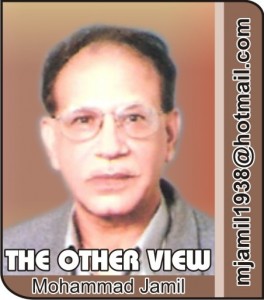All of us in our own different ways are in fact involved in the defence of the country. But the personnel of the armed forces lay down their lives so that their compatriot could live in an environment of peace and without trepidation and fear. The success of Pak Army in thwarting our enemies’ designs and its popularity in the masses has caused dismay and frustration among the adversaries of Pakistan. There have been systematic attempts by foreign agents disguised as liberals to cast shadows on the role of Pak Army to demoralize the nation. In order to pursue their sinister designs, our adversaries are using all tactics including misinformation, deception, media utilization etc., to poison or confuse the minds of people, students and other strata of society. Young students particularly studying in elite and modern educational institutes become an easy prey to their creepy scheming.
It is the responsibility of all concerned to ensure that these future leaders are not misled through controversial syllabi or by the self-styled pseudo intellectuals. So-called liberals are raising issues of human rights, create hype about the activities of sub-nationalists, generate controversy on East Pakistan debacle and attempt to develop controversies about Baluchistan situation and Kashmir issue. Of course, some NGOs have played ignominious role by creating controversies and trying to make some prestigious institutions as disputatious. The nation rejects and denounces such elements who are trying to tarnish the image of national institutions. There is need to ensure that syllabus at various institutions be free from any material which misleads our youth and make them prone to negative propaganda. A system of institutional scrutiny should be put in place to thwart any effort to create fissures among masses or project negative image of national institutions.
The government should realize that if such elements are allowed to continue their propaganda against Pakistan and its institutions, it can be disastrous for the country. Since the government has to formulate a common policy acceptable to great majority of the people, it should enter into dialogue with those advocating different policies with a view to creating unanimity. It is indeed a stupendous task to bring different thinking minds, traversing different paths, operating on different wave-lengths on one focal point. In a functional democracy, it can be achieved through dialogue, persuasion and appealing to the intellect of the opposition for common goal. However, when the contradictions become irreconcilable, recourse is made to coercion. Max Weber had said: “A state is a human community that claims the monopoly of the use of physical force within a given territory”. In other words, the government has to use force to establish the writ of the state.
Media must make efforts to create cohesive thoughts and promote harmony among different segments of society. Every media anchor should introspect whether it helped Pakistan in overcoming internal turmoil and enabling the people of Pakistan to face the external challenges with vigor and firm resolve. What kind of freedom of expression is it, which has possessed our chattering classes, analysts and pseudo-intellectuals that it knows no bounds or limits; and they are giving such a blatant display of it so recklessly and self-conceitedly? Surely, freedom of expression is an open polity’s inviolable part; but in no event can this freedom be a license to say things violating provisos of other articles of the Constitution and stipulations in the National Action Plan. In no event can this be a license to undermine security of Pakistan, as it has degenerated in this country.
There are certain sacrosanct limits that have to be exercised in the civil polities. Those universally accepted norms and standards have to be adhered to in all conditions. But all those niceties are thrown out of the window by our chattering classes. Our chattering classes, some writers and analysts in fact take a particular pride in an uninhibited expression, holding it up boastfully as a manifest of their independent mind. In this pursuit, they are indulging in an unrestrained self-flagellation, and in their first pretentious device pick up military and intelligence agencies for vituperative and onslaught considering them as a fair game for expression of their unbounded freedom. It would not be an exaggeration to say that freedom of expression is one of the most abused freedoms in Pakistan. Commentariat in general and some media persons in particular have been flouting the provisions of the Constitution in the name of freedom of expression with impunity.
Samuel P Huntington in his book titled ‘The soldier and the state: the theory and politics of civil-military’ wrote: “A state can achieve little by diplomacy unless it has the strength and the will to back up its demands with force”. Renowned Admiral Nelson had once said: “A fleet of British ships of war is the best negotiator in Europe”. It has become a norm that military man has to calculate or estimate the extent of the threat to the state. Of course, the politicians, rather statesmen set the goal on the basis of information provided by the military leadership, and allocate necessary resources to be used in attaining that goal. In all democracies, kingships or dictatorships military appears to be the only institution capable of enforcing and preserving political stability and order. Of course, political leadership should take measures to solve the problems of the people, ensure socio-economic justice, and last but not the least the elected leaders should not give overriding consideration to their personal interests over the national interest.
- Latest
- Trending




